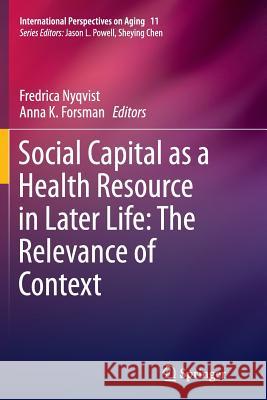Social Capital as a Health Resource in Later Life: The Relevance of Context » książka
topmenu
Social Capital as a Health Resource in Later Life: The Relevance of Context
ISBN-13: 9789402407129 / Angielski / Miękka / 2016 / 267 str.
Kategorie BISAC:
Wydawca:
Springer
Seria wydawnicza:
Język:
Angielski
ISBN-13:
9789402407129
Rok wydania:
2016
Wydanie:
Softcover Repri
Numer serii:
000421158
Ilość stron:
267
Waga:
4.34 kg
Wymiary:
23.5 x 15.5
Oprawa:
Miękka
Wolumenów:
01
Dodatkowe informacje:
Wydanie ilustrowane











